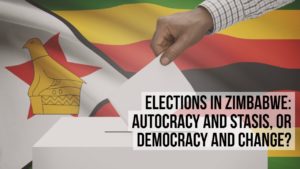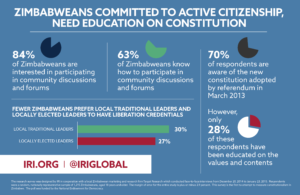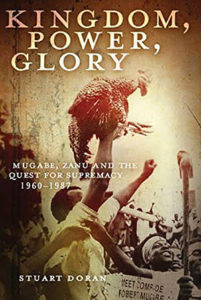 It is beyond dispute that the massive voter turnout for Zimbabwe’s July 30 presidential election demonstrated that Zimbabweans want a transition away from the divisions, brutality and economic ruin of the Robert Mugabe era, according to the leaders of a joint International Republican Institute (IRI) and National Democratic Institute (NDI) international delegation* which observed the poll.
It is beyond dispute that the massive voter turnout for Zimbabwe’s July 30 presidential election demonstrated that Zimbabweans want a transition away from the divisions, brutality and economic ruin of the Robert Mugabe era, according to the leaders of a joint International Republican Institute (IRI) and National Democratic Institute (NDI) international delegation* which observed the poll.
Zimbabwe, however, has not yet established a process that treats all political parties equitably and allows citizens to be confident that they can cast their votes and express political opinions free from fear of retribution, they write.
 The election aftermath has been a brutal reminder of the problems of Zimbabwe’s transition to a mature African democracy, notes Sue Onslow, deputy director of the Institute of Commonwealth Studies. Already a warning has come from an influential American election observer that the army’s violent behavior will have a disastrous influence on Congress’ review of US sanctions and Washington’s willingness to agree to IMF support for debt restructuring. Mnangagwa’s PR strategy of Zimbabwe ‘open for business’, ushering in a new era of reconciliation and reform, has been dented, probably irretrievably, by the Zimbabwe army’s determination to dictate politics, she adds.
The election aftermath has been a brutal reminder of the problems of Zimbabwe’s transition to a mature African democracy, notes Sue Onslow, deputy director of the Institute of Commonwealth Studies. Already a warning has come from an influential American election observer that the army’s violent behavior will have a disastrous influence on Congress’ review of US sanctions and Washington’s willingness to agree to IMF support for debt restructuring. Mnangagwa’s PR strategy of Zimbabwe ‘open for business’, ushering in a new era of reconciliation and reform, has been dented, probably irretrievably, by the Zimbabwe army’s determination to dictate politics, she adds.
 The IRI-NDI delegation propose a number of reforms that the government of Zimbabwe should address:
The IRI-NDI delegation propose a number of reforms that the government of Zimbabwe should address:
- Ensure the ZEC is widely perceived to be an independent election management body capable of administering credible elections, including adopting more consultative and transparent procedures;
- Enforce the constitutional requirement to achieve gender parity in government institutions and develop measurable strategies for involving women in all aspects of governing, including promoting opportunities for women to be successful electoral candidates and ending all forms of violence against women’s political participation;
- Encourage meaningful multi-party democracy and maintain an environment of free political expression and tolerance for opposing views, including fostering a diverse, independent media environment representing a variety of political perspectives;
- Ensure that parliamentary rules and procedures provide meaningful roles for opposition MPs and parties in the legislative process and in the discussion of issues of national importance;
 Develop consultative mechanisms with civil society and stakeholders from across the political spectrum to create and implement public policies that are beneficial for all Zimbabweans, not just a select few;
Develop consultative mechanisms with civil society and stakeholders from across the political spectrum to create and implement public policies that are beneficial for all Zimbabweans, not just a select few;- Develop an anti-corruption and responsible governance agenda that roots out the sources of misuse of state resources and ensures that issues related to the general welfare are priorities, including reducing the involvement of the military in the civilian political and commercial activities of the country;
- Foster an independent judiciary that endeavors to adjudicate fairly and justly through due process of law; and
- Strictly protect the constitutional rights of citizens to associate and to peacefully assemble and protest free from excessive use of force by state security forces, including prosecuting those responsible for the August 1 shootings of protesters by Zimbabwe Defence Forces.
 *Ellen Johnson Sirleaf was President of Liberia; Catherine Samba-Panza was Interim President of the Central African Republic; Karen Bass is the Ranking Member of the US House of Representatives African Affairs Sub- Committee [and a board member of the National Endowment for Democracy]; Constance Newman and Johnnie Carson each served as Assistant Secretary of State for African Affairs, respectively, under President George W. Bush and Barack Obama. Johnnie Carson and Constance Newman co-led the IRI-NDI post-election delegation to Zimbabwe from September 4 to 7, 2018.
*Ellen Johnson Sirleaf was President of Liberia; Catherine Samba-Panza was Interim President of the Central African Republic; Karen Bass is the Ranking Member of the US House of Representatives African Affairs Sub- Committee [and a board member of the National Endowment for Democracy]; Constance Newman and Johnnie Carson each served as Assistant Secretary of State for African Affairs, respectively, under President George W. Bush and Barack Obama. Johnnie Carson and Constance Newman co-led the IRI-NDI post-election delegation to Zimbabwe from September 4 to 7, 2018.







